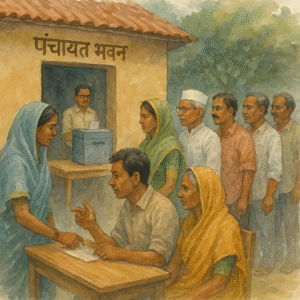Simplified Explanation of the Judgment
This Patna High Court judgment concerns the termination of a rural petrol pump dealership (Kisan Seva Kendra) by a public sector oil company. The petitioner challenged a termination letter dated 21.06.2023, which had abruptly ended the dealership agreement executed on 17.12.2018, and sought restoration of fuel supplies to the retail outlet. The matter was heard and decided on 25.07.2024 by a Single Judge Bench.
The controversy began when the corporation acted on an anonymous complaint alleging that the petitioner had misrepresented his marital status and thereby secured the dealership despite a supposed bar arising from an existing dealership held by the petitioner’s father. The company relied on two data points: (i) the petitioner’s initial application mentioned his spouse as “Sweta Roy,” and (ii) before issuance of the Letter of Intent (LOI), a notarized affidavit named the spouse as “Anjali Kumari.” From this discrepancy, the corporation inferred that the petitioner was not actually married on the application date and had manipulated records to bypass eligibility restrictions.
The petitioner, however, produced multiple documents to show that his spouse is known by two names—“Sweta Roy” and “Anjali Kumari.” These included the marriage card, transfer certificate, school leaving certificate, an affidavit sworn before an Executive Magistrate, and a certificate from the local Gram Panchayat ward member. According to the petitioner, these documents pre-dated or were independent of the inquiry and consistently showed the two names used interchangeably for the same person. The petitioner also pointed out that before the formal termination, the company had already halted supplies (on 08.01.2023), causing significant operational hardship.
The High Court closely examined both sides’ narratives. A pivotal fact that weighed with the Court was that the corporation’s action originated from an anonymous complaint, i.e., a complaint that did not reveal the complainant’s identity or furnish particulars. The Court observed that such a complaint, by itself, is a weak foundation for drastic punitive action—especially when the licensee produces verifiable documents supporting their case. Notably, the authorities had verified the school certificate about the spouse’s name and found it genuine but still chose to disbelieve it.
The Court stressed two key principles:
- Actions based on anonymous complaints, without credible corroboration, are suspect. Administration must not undertake a “wild goose chase” that culminates in a punitive decision lacking substantive proof.
- When an affected party provides consistent, genuine documents supporting their version (here, that the spouse uses two names), the burden lies on the authorities to produce concrete, contrary evidence. In the absence of such evidence, termination cannot stand merely on suspicion or assumptions.
Applying these principles, the Court found the termination illegal, arbitrary, and contrary to law. It set aside the termination letter dated 21.06.2023 and directed the authorities to immediately resume fuel supplies to the dealership. Importantly, the Court preserved the corporation’s right to proceed in the future if it secures concrete proof—such as reliable evidence that the petitioner was not married on the application date or that the submitted documents are not genuine—provided the petitioner is given due notice and an opportunity to respond, and a reasoned order follows. However, such liberty to re-examine does not permit any postponement in resumption of supplies pursuant to this judgment.
In short, the ruling protects fair procedure and ensures that livelihoods—especially those connected with essential public services like fuel distribution—are not disrupted based on unverified, anonymous allegations. It also underscores that minor discrepancies in names, which are common in rural and semi-urban documentation across India, cannot automatically be treated as fraud without solid proof.
Significance or Implication of the Judgment (For general public or government)
This decision reinforces that government entities and public sector corporations must act on credible, verifiable evidence and follow fair procedure before cancelling licenses or terminating dealerships. For the public, especially small entrepreneurs operating outlets like Kisan Seva Kendras, the ruling is a reassurance that livelihoods will not be jeopardized on the basis of anonymous complaints or name-variation technicalities that often occur due to local documentation practices. For the government and PSUs, the judgment is a reminder to adopt robust verification mechanisms, respect the principles of natural justice, and avoid punitive decisions grounded on suspicion rather than proof. It also promotes administrative accountability: if documents are found genuine upon verification, authorities should not arbitrarily discard them; and if fresh evidence emerges later, it must be used through a lawful, notice-based process.
Legal Issue(s) Decided and the Court’s Decision with reasoning
- Whether the dealership termination based primarily on an anonymous complaint and name discrepancies (spouse’s two names) could be sustained.
• Decision: No. The Court held the termination illegal, arbitrary, and unsustainable. The corporation acted on an anonymous complaint and ignored genuine, verified documents establishing that the spouse is known by two names. There was no concrete contrary evidence. - Whether name variations (e.g., “Sweta Roy” and “Anjali Kumari”) in official and local documents amount to fraud absent proof of intent to deceive.
• Decision: No. Variations in names, common in local records, cannot be treated as fraud without definitive proof. The authorities had even verified the school certificate and found it genuine. Disbelieving it without solid contrary material is arbitrary. - Whether fuel supplies should be resumed immediately after setting aside termination, and whether the corporation retains liberty to act if future concrete proof arises.
• Decision: Yes, supplies must resume immediately. The corporation is free to act later if it obtains concrete proof, but only after following due process (notice, opportunity, reasoned order). This liberty does not justify delaying resumption now.
Case Title
Nitesh Kunal Vs. Indian Oil Corporation Limited
Case Number
Civil Writ Jurisdiction Case (CWJC) No. 12664 of 2023.
Citation(s)
2025 (1) PLJR 505
Coram and Names of Judges
Hon’ble Mr. Justice A. Abhishek Reddy.
Names of Advocates and who they appeared for
For the petitioner: Mr. Neeraj Kumar Gupta, Advocate.
For the respondents: Mr. Sanat Kumar Mishra, Advocate.
Link to Judgment
MTUjMTI2NjQjMjAyMyMxI04=-JSd–ak1–12QXeQ4=
If you found this explanation helpful and wish to stay informed about how legal developments may affect your rights in Bihar, you may consider following Samvida Law Associates for more updates.








